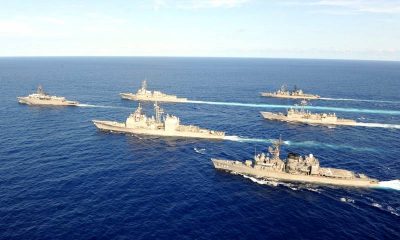US Militarizes the Caribbean Sea to Surround Venezuela

Recently, the number of American ships and planes in the Caribbean Sea has increased exponentially. The most likely hypothesis so far is that there will be an attempt to block Venezuela, as the military flow in the region began to grow only after Iran announced the sending of oil ships to the Bolivarian country. On May 14, Venezuelan Foreign Minister Jorge Arreaza said that the boats that take gasoline to Venezuelan ports are being persecuted by the American Navy, which is worsening with the arrival of Iranian ships.
The White House has already reported that it has taken retaliation against this cooperation between Venezuelans and Iranians, but no further information has been provided on the military operations being carried out. The United States has announced sanctions against any company that participates in the supply of gasoline to Venezuela, which is causing a structural crisis of fuel scarcity in the South American country.
In addition to the blockade, there is a humanitarian issue, as American measures are inducing a major economic recession in the Bolivarian Republic. It has also been reported by the Venezuelan government that the tax imposed by the United States is affecting the country’s food supply, which is already having an effect on society. With a crisis and the siege being imposed on Caracas, how do Venezuelans use to deal with the advancing pandemic of new coronaviruses? How can the Bolivarian government manage a major economic and social crisis with imminent health danger? It is just the American strategy: to raise a siege and provoke the Venezuelan national collapse, inducing, through coercion, Nicolás Maduro’s government to accept changes in the regime for the benefit of Washington.
The naval blockade is just one of the measures the United States is taking to overthrow Nicolás Maduro‘s legitimate government. A few days ago, an attempted invasion against the country, carried out by Colombian mercenaries on American speedboats, was neutralized, with several terrorists arrested. Apparently, the sea will be the path by which Washington will try to overthrow Maduro, insisting on the military operation as solution of international controversies. The case also indicates the presence of the so-called “extermination war”, an ancient warlike practice in which a country is surrounded and kept under block by the navy of another nation, preventing the arrival of goods and food in port areas, affecting the population as a whole, indirectly leading thousands of people to hunger, misery and death. Basically, this is exactly the American goal in Venezuela with the current blockade. Without formally declaring war, Washington adopts an even more insidious strategy than traditional military confrontation.
However, there is yet another important factor – and above Venezuela – behind the American interest in militarizing the Caribbean Sea. Since at least the First World War, the USA has occupied a position of undisputed supremacy on the seas, which allowed Washington, in time, to exercise a role of “global naval police”. However, this reality is changing day after day, since the world is already beginning to contemplate a response from nations to American naval power, especially in Asia.
In the Asian continent, China and Iran are challenging the American Navy. In China, the progress of the Navy is absolute, with the Chinese having already succeeded, for the first time in its history, to overcome the International Date Line and concluding military tests in spaces traditionally occupied by American maritime forces. In Iran, the maneuvering of small vessels against large American ships is daring.
The United States has spoken out several times condemning its opponents in China and Iran, but nothing has been done other than a mere war of words. In practice, it is difficult to deny that the United States has a naval power today that is much less powerful than it was decades ago.
Washington did not attack its rivals in Asia simply because it could not handle a counteroffensive from Beijing or Tehran – at least not without a big material loss as a result.
All of these factors are contributing to a redirection of the American Navy’s strategic policies. No longer able to keep its global power intact, Washington manages its forces for the southern portions of the American continent itself, guaranteeing a regional space of power. However, in the Americas the opposition to US possible aggression will be fierce and will have international support from other continents.
*
Note to readers: please click the share buttons above or below. Forward this article to your email lists. Crosspost on your blog site, internet forums. etc.
This article was originally published on InfoBrics.
Lucas Leiroz is a research fellow in international law at the Federal University of Rio de Janeiro.
Featured image is from InfoBrics

